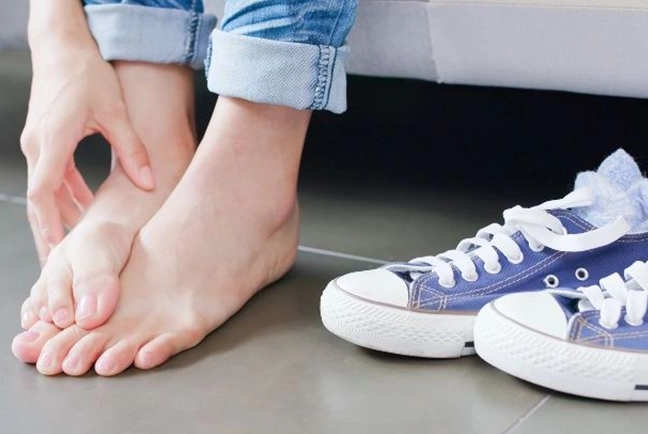

Nail Fungus Treatment
Convenient Telehealth
Nail fungus (Onychomycosis) is a common condition affecting an estimated 40 million Americans. It begins as a white or yellow spot under the tip of your fingernail or toenail. As the fungal infection goes deeper, nail fungus may cause your nails to discolor, thicken and crumble at the edge. The shape of your nail may become distorted, and you may start to notice a foul odor.
Some ways to help prevent nail fungus infection include.
- Wear sandals when walking in warm, moist areas like locker rooms, spas, public showers, and pools.
- Change your socks if they start to get sweaty and use a new pair of clean socks every day.
- Wear shoes that are not too tight and allow your feet to breath.
- Keep your feet clean and dry
- Sprinkle anti-fungal powder in your shoes.
- If you recently finished treating toenail fungus, throw away the footwear that you wore before starting treatment.

Save time, money, and hassles

Quick urgent care and attention

Affordable quality care for all
Medicated Nail Lacquer
- For mild cases, or patients that cannot tolerate oral therapy. Sometimes used in combination with oral therapy.
- Daily application to the affected nails and surrounding skin.
- Treatment takes time and you may need to use this medication for up to a year.
Oral Antifungal Medication
- Recommended first choice therapy as it can clear the infection more quickly than topical therapy.
- Treatment involves taking medication daily for 6 to 12 weeks.
- Terbinafine most commonly used. Itraconazole is an alternative.
Surgery
- In more severe cases that are not responding to standard oral or topical therapy, you may need to see a specialist for more invasive options.
Toenail fungus is a fungal infection that occurs when fungi, such as dermatophytes, invade the nails. This can lead to discoloration, thickening, and brittleness of the toenails. While it’s not always a serious medical concern, it can be bothersome and impact the appearance of your nails.
Prevention Strategies
1. Maintain Good Foot Hygiene
- Clean your feet regularly, making sure to thoroughly dry them, especially between the toes. Fungi thrive in warm, moist environments.
2. Choose Breathable Footwear
- Opt for shoes made of breathable materials like mesh to reduce moisture, creating an unfavorable environment for fungal growth.
3. Proper Nail Maintenance
- Trim your toenails straight across, avoiding cutting them too close to the skin. This minimizes the risk of fungal infections and helps maintain overall nail health.
4. Avoid Walking Barefoot in Public Areas
- Fungal infections can spread in communal spaces like swimming pools and locker rooms. Wear protective footwear to reduce the risk.
5. Use Antifungal Powders or Sprays
- Apply these products to your feet and inside your shoes to prevent the growth of fungi.
While home remedies may not always be a cure, they can complement preventive measures and contribute to managing toenail fungus.
1. Tea Tree Oil
- Known for its antifungal properties, apply it directly to the affected nail regularly.
2. Baking Soda Soak
- Mix baking soda with water to create a soak that may inhibit fungal growth.
3. Propolis Extract
- This bee product has shown effectiveness against fungal infections.
4. Lemongrass
- Its antifungal properties make it a potential remedy.
5. Horopito
- This plant contains active chemicals with antifungal properties.
Remember, consistency is key when implementing these preventive strategies and home remedies. However, if symptoms persist or worsen, seeking professional medical advice is crucial.
Toenail fungus, or onychomycosis, can be a persistent condition that requires medical intervention for effective treatment. Here, we’ll review various medical treatment options available.
1. Oral Antifungal Medications
- Overview: Traditionally, oral antifungal medications have been a cornerstone in treating toenail fungus.
- Examples: Itraconazole (Sporanox) and terbinafine (Lamisil) are commonly prescribed. These drugs promote the growth of a new, healthy nail.
- Considerations: Potential side effects and the need for regular monitoring during treatment.
2. Topical Antifungal Medications
- Overview: Applied directly to the affected nails, topical antifungal medications come in various forms, including creams, ointments, and nail lacquers.
- Examples: Ciclopirox (Penlac) is a common topical treatment.
- Considerations: Limited effectiveness due to difficulty penetrating the nail.
3. Laser Therapy
- Overview: Laser therapy involves the use of laser light to target and destroy the fungus in the nail.
- Considerations: Limited evidence supporting its efficacy, and multiple sessions may be required.
4. Photodynamic Therapy
- Overview: Combines light activation with a photosensitizing agent to target the fungus.
- Considerations: Research is ongoing, and its availability may be limited.
5. Surgical Options
- Overview: In severe cases, surgical procedures such as nail avulsion (removing the infected nail) may be considered.
- Considerations: Generally reserved for cases where other treatments have not been successful.
In summary, the medical treatment landscape for toenail fungus is diverse, with oral antifungals being a common and effective choice. However, each option comes with considerations, and consulting with a healthcare professional is crucial to determine the most suitable approach for individual cases.
How does it work?
1.Sign Up
Click the Sign-Up button below and register with us on the Push Health platform. It’s safe and secure, and sign up is free.
2. Message Us
After signing up, you can place a prescription request or just message us through the platform.
3. Get Treatment
We will review your info, and message you back. Once approved, prescriptions will be sent to your pharmacy of choice
Hours of operation: Monday – Sunday 9AM – 9 PM After hour requests will be addressed the following day.

Fees
Virtual consult through messaging or phone call with prescription sent to your pharmacy is
$64.99
Conditions we are unable to treat
- We do not see patients under the age of 18
- Our services are only available in Florida.